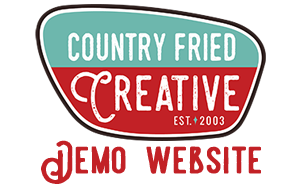by Joe Domaleski | Feb 12, 2024 | Blog, Business, Columnists, Community, Front Page, News Center, Opinion, Top News
Much of the information we consume is fed to us algorithmically by computers in the form of memes, social media posts, brief video clips, and other short forms of media. (Editor’s note:Yes, that was Taylor Swift’s name in the article title. That’s not click-bait. We will bring the subject of Taylor Swift a little further down into this article. Be patient and read along as we lay the foundations to make her carbon footprint relevant to this article).
When something goes “viral,” people register a “like” or comment and then pass it along to others without much thought, similar to a biological virus. Before you know it, whole segments of the population are potentially “infected” by misinformation. Although it’s not always intentional, misinformation is a real problem in today’s society. In a previous article, I wrote about a related concept called The Matthew Effect. With the rise of generative AI (artificial intelligence), the problem is likely to get worse. In fact, many media outlets are considering putting warning labels on AI-generated content.
We live in a noisy, data-drenched world, and yet truth is such a rare commodity. I’m reminded of that famous line, “Water, water everywhere and not a drop to drink,” in Samuel Taylor Coleridge’s poem, ‘The Rime of the Ancient Mariner’. In the poem, those lines are spoken by a thirsty mariner who is adrift at sea but unable to drink from the saltwater sea. It conveys a sense of irony and despair of being surrounded by something in abundance yet being unable to use it. As a society, I think most of us thirst for the truth. Here’s my modern take on that famous poetic line:
Data, data everywhere,
yet seldom do we think.
We are literally surrounded by data. When you are born, you get a social security number that’s a form of data to establish your identity and track you for the rest of your life. In school, you have report cards, test scores, and grades that go into your academic transcript. Everything you do online is tracked. Everywhere you go is tracked by GPS or a roadside camera. Organizations and governments capture data. Medical providers keep data on patient care. Insurance companies keep data on claims. Stores keep data on sales transactions. Banks and credit agencies use data to assess risk and account for financial transactions. Your personal preferences are noted and captured by social media, streaming music outlets, and video services. In short, there’s no shortage of data everywhere about everything. The abundance of data has advantages and disadvantages to society. We can examine the disadvantages and concerns in a future article.
In our quest for the truth, let’s turn our attention to the advantages of having so much data. A quality, original source of data has the potential to provide indisputable, unfiltered truth. Most of us rely on traditional forms of news information in which a human author (or AI) attempts to summarize, explain, or elaborate on something that we assume started as facts from an original data source. Conventional journalism often relies on interviews, observation, and qualitative analysis. This is very helpful when done correctly. It’s not always easy or straightforward to get insight from raw data. On the other hand, the potential for abuse and bias increases as layer upon layer of commentary drifts away from the original, underlying truth.
Data journalism is a relatively new term that flips the story-writing process upside down to start with the data, not the human commentary on the data. It adds a quantitative dimension to stories, research, and investigation. Although the term is new, the concept isn’t. Data journalism was inspired by investigative reporting based on open records requests, meeting minutes, transcripts, data charts, budgets, and other forms of data. Specifically, data journalism is concerned with mostly numerical data since numbers tend to be less nuanced and most objective than words. During the COVID-19 pandemic, the publisher of this paper used data journalism by reporting on the numbers such as those discussed towards the end of the pandemic.
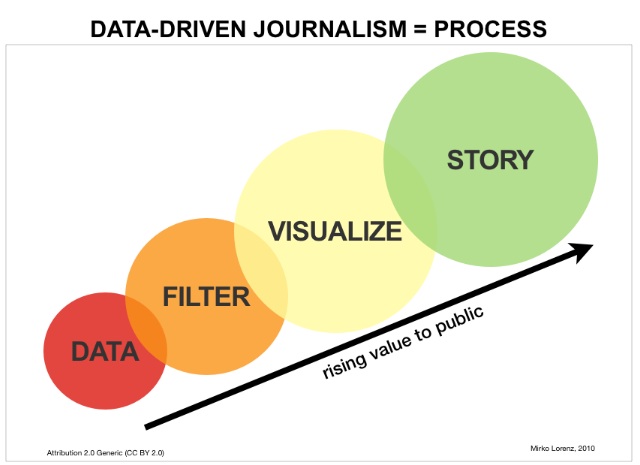
Data driven journalism process graphic. Attribution 2.0 Generic (CC BY 2.0) Source/Mirko Lorenz
So what is data journalism? One commonly accepted academic definition suggests the practice of data journalism is “a way of enhancing reporting and news writing with the use and examination of statistics in order to provide a deeper insight into a news story and to highlight relevant data. One trend in the digital era of journalism has been to disseminate information to the public via interactive online content through data visualization tools such as tables, graphs, maps, infographics, microsites, and visual worlds.” (Antonopoulos, Nikos; Karyotakis, Minos-Athanasios (2020). The SAGE International Encyclopedia of Mass Media and Society. Thousand Oaks, CA: SAGE Publications, Inc. p. 440).
As someone who’s been working with data most of my professional career, my own definition of the term is that data journalism is the use of computer technology, statistics, and data visualizations to help tell a story. Whereas traditional journalism may include a graph or chart, data journalism makes that a central feature. Data journalist Mirko Lorenz says that “data-driven journalism is primarily a workflow that consists of the following elements: digging deep into data by scraping, cleansing, and structuring it; filtering by mining for specific information; visualizing and making a story.” Here’s an example from the Atlanta Regional Commission.
Source: Atlanta Regional Commission – 21-County Data Dashboard
This approach to reporting relies on three activities: accessing a quality data source, analyzing (aka “interrogating”) the data to understand it, and visualizing the data into a graphical format that tells a story. Examples of data visualizations include infographics, database listings, data-enriched maps (like Google Maps), dashboards, interactive graphics, charts, and even 3D virtual reality explorations. Data journalism tends to rely less on words and more on pictures – but pictures based on original data sources.
There are many advantages to data journalism:
- Enhanced Objectivity: Data visualizations based on original sources tend to be less susceptible to personal bias.
- Greater Depth and Context: It’s been said that a picture is worth a thousand words. Visual storytelling allows the reader to explore information in a deeper, more meaningful way than traditional word-based media.
- Higher engagement: The ability to see and explore data “hands-on” is more fun and engaging for the audience. Take a child to a science museum with interactive exhibits and compare that to a science textbook to see what I mean.
- Increased comprehension: Data presented in an interactive format encourages readers to explore the information themselves, leading to greater insights and understanding. Instead of being told what to think, the reader has to use their own brain to draw conclusions.
- Uncovering new insights: Data visualizations often uncover patterns, trends, and knowledge that’s not obvious in a traditional written story.
There are some disadvantages to this approach to journalism as well:
- Increased complexity: Even though a visual approach to storytelling has the potential to be more user-friendly, it does require the target audience to use their eyes and brains. Some people like to be told what to think, so data journalism wouldn’t be appropriate for them.
- Risk of Misuse: Statistics and graphs can be misused to skew or distort the truth. Correlation is not the same as causation. Look that one up.
- Risk of misinterpretation: Even if the visualization is sound, the target audience may be confused and make improper interpretations contrary to the facts. This problem isn’t unique to data journalism; all forms of communication are subject to misinterpretation.
- Bad data: Proper data journalism requires accurate and available data. Beware of data visualizations that are based on incomplete, outdated, or biased information. Always look for the original data source citation and avoid homemade infographics with no citation.
- Privacy: The right to privacy and the right to know are two, often conflicting societal goals. On one hand, the proliferation of data has made life easier. On the other, it’s made it harder than ever to live a private life. Most data-driven stories avoid personal data unless it involves a public figure.

Taylor Swift at the 2024 Golden Globes on 2/7/24. Attribution 3.0 Generic (CC BY 3.0) Source/iHeartRadioCA
Here’s a recent situation regarding data journalism. Does the public have a right to know where Taylor Swift travels in her private jet? A young data journalist has been using publicly available data to publish information about her travels.
Taylor Swift launches legal salvo at student who tracks private jets via public data
(Source – ABC News website, 2/7/24)
Does the public have a right to know, or does Taylor have a right to fly in privacy? Some have even correlated the flights with the carbon footprint it leaves behind, noting the potential hypocrisy in Swift’s public comments related to global warming.
Why Taylor Swift’s globe-trotting in private jets is getting scrutinized
(Source – AP News website, 2/7/24)
By the way, as I was writing this story, there’s been some breaking news that Taylor Swift sold her jet amid the uproar. Regardless of how you may personally feel about the story, this is a great example of the impact made by data journalism.
My intention isn’t to pick on Taylor Swift. Quite the contrary, I don’t mind admitting that I enjoy her music and think she’s quite talented. In fact, congratulations to Taylor Swift’s boyfriend Travis Kelce on the Kansas City Chief’s win at the Super Bowl. What a game!
Anyway, back to the main article theme. By using data journalism many things we assume are true based on a single headline just don’t stand up to scrutiny. In the broader discussion about carbon emissions, one would think the United States is the worst offender based on the news. Consider the following data visualization.
Not only is it not true that the US is the worse offender, carbon emissions in the US are on the decline. China is the worst offender and their carbon emissions are growing. The data speaks for itself. I’ll leave it to the reader to put their own interpretation of what this signifies.
So, what does all of this mean for you and the readers of this newspaper? In the upcoming weeks, I will be working with the publisher to create and publish some new features that use data journalism methodology. Some of these features will start as simple data aggregation features, but over time we hope to create some fun and compelling data visualizations based on real and relevant data. In all cases, we will cite the data sources (just like it’s done in traditional news stories) and when possible provide a direct link to those sources.
Our goal? To provide the discerning reader more opportunities to discover the truth for themselves. There is a wealth of publicly available data produced by our local, state, and national governments. At the local level, both of our two largest municipalities have gone to great lengths to provide more data and communications to the citizens – that’s good, and I have personally thanked both mayors for their efforts in communicating with the public using different methods. Yet, we all know that a free press is a good thing for a community. The online edition of this newspaper was one of the original news sites that goes all the way back to the late ’90s. An online strategy has always been an integral part of the operation at The Citizen. We aim to take that to the next level by adding quality data journalism to the mix.
So, what would you like to see? Let us know, and we’ll look into it.
[Joe Domaleski, a Fayette County resident for 25 years, is the owner of Country Fried Creative – an award-winning digital marketing agency located in Peachtree City. His company was the Fayette Chamber’s 2021 Small Business of the Year. Joe is a husband, father of three grown children, and proud Army veteran. He has an MBA from Georgia State University and enjoys sharing his perspectives drawing from thirty years of business leadership experience. Sign up for the Country Fried Creative newsletter to get marketing and business articles directly in your inbox. ]
by Joe Domaleski | Jan 29, 2024 | Blog, Business, Columnists, Community, Front Page, News Center, Opinion, Top News
Idon’t necessarily consider myself a “prepper,” but I do like to be prepared in case of emergencies. When I was a Boy Scout, I was taught to “Be Prepared.” We often think of emergency preparedness as having supplies and plans in place for first aid, food, water, battery power, shelter, important documents, and money. Those are all good and necessary preparations, but how about communications? Instant communications with cellphones and the internet have spoiled us. What happens if those forms of communication fail? It’s admittedly old-school technology, but amateur (ham) radio works when other forms of communication fail.
Before there were cellphones, the internet, or even television, if you don’t count smoke signals and signal flags, the world’s first form of wireless communication was radio. The ability to hear voices, music, and news through thin air was (and still is to me) somewhat magical. I’ve always had a personal interest in radio. As a middle-schooler, I enjoyed building crystal radio kits that allowed me to hear distant radio stations from around the world without batteries! Shortwave radio stations allowed me to hear news and music from faraway places like London through the BBC World Service, the Soviet Union (now Russia) through Radio Moscow, and obscure Pacific islands whose primary connection to the world was radio.
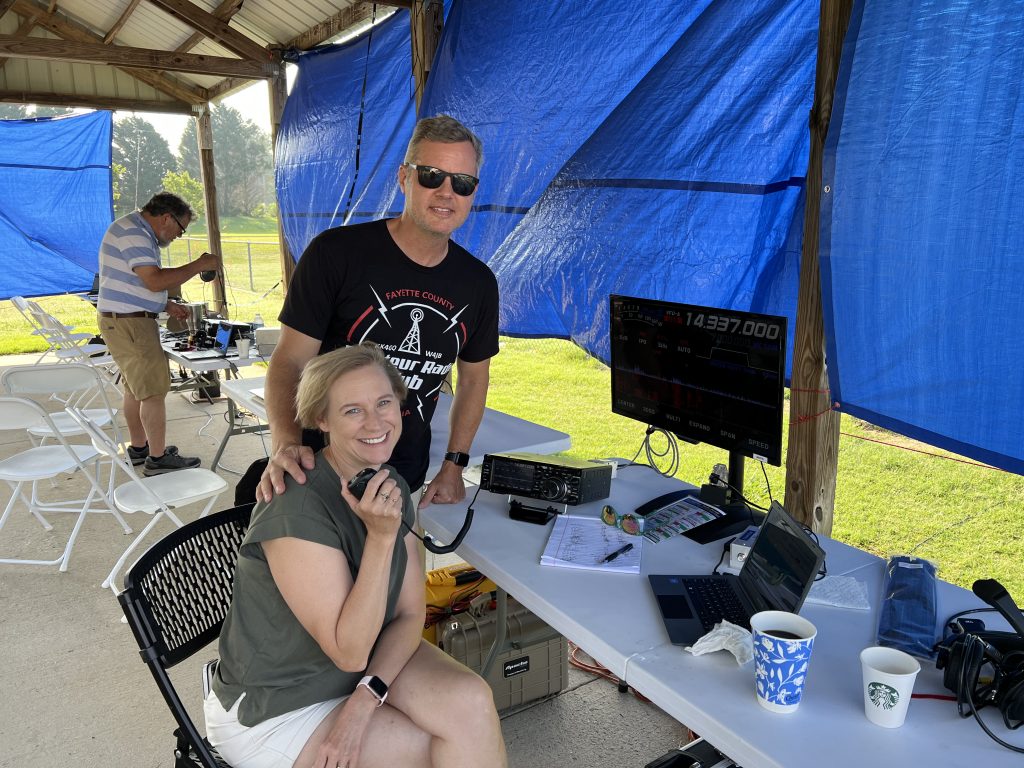
Joe (KI4ASK) & Mary Catherine (KI4HHI) Domaleski at the 2023 Fayette County Amateur Radio Club field day event in Brooks, GA. Photo/Bryan Macera
Closer to home, I enjoyed listening to scanners – not the type of scanner you hook up to a computer to make copies of documents, but radio scanners that gave me the ability to listen to our police, fire, airport traffic, and more. Radio opened up a whole new world to me, and I remained fascinated with it all through high school. Yes, Radio Shack was one of my favorite stores at the mall.
My first exposure to two-way radio (meaning that I could listen and talk) was probably a set of GI Joe walkie-talkies that my brother and I got for Christmas one year. We had fun riding around the neighborhood on our bikes, talking on the radio about “secret missions.” Go watch “Stranger Things” – Dustin was me in high school (although I was a little skinnier). During the CB radio craze of the late 70s, my father put one in his truck, and I enjoyed talking to people as we traveled down the highway, saying things like, “Breaker One-Nine, this is the Little Polack.” Yes, my CB handle was “Little Polack,” and my dad was the “Georgia Polack.”
In the Army, we used radios a lot, but as an officer, I had a soldier assigned to me as my RTO (Radio Telephone Operator), so most of my radio communications went through him. While I was in the Army, I learned about something called MARS (Military Auxiliary Radio System), where a group of amateur (ham) radio operators helped relay information to/from home using radio and phone patches. Satellite phones were becoming a thing, but my dad said MARS actually helped him find out about my birth while he was in Vietnam.
The world changed dramatically on September 11, 2001. By then, cell phones were very prevalent, but it became clear to me that we had an overreliance on the internet and cell technology. I saw firsthand how many people in New York were literally cut off from the world, even as they were in the middle of the action. We knew more about what was going on by watching it on TV at home than the people directly involved in the situation. This was a wake-up call for me to become more individually prepared for communications. Remembering what I knew about the usefulness of ham radio, I decided to get my license the following year.
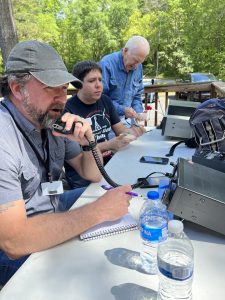
Jack Parks (KO4WBM) and Bryan Macera (K7CPT) operating a portable ham radio station during a club picnic. Photo/Joe Domaleski
Becoming a ham radio operator requires taking an FCC multiple-choice test administered by a group of certified Volunteer Examiners. It’s not a hard test. In fact, the questions and answers are made public. Most of the test questions pertain to some basic rules and radio knowledge. Once I got licensed, my wife Mary Catherine decided to get licensed, so she took the test. We found ham radio useful for keeping in touch around town. While she was driving the minivan around with our kids, I could talk to her on the radio and save precious cellphone minutes. Back then, you paid for cell phone calls by the minute. Ham radio was and still is free. My ham radio callsign is KI4ASK, and her callsign is KI4HHI, both of which were assigned to us by the FCC.
For the past twenty years, we’ve found ham radio to be both a fun and useful hobby. Here are some of the things we’ve done with our ham radio licenses:
- Maintaining contact with each other and friends on hiking trips, where cellphone coverage is spotty.
- Supporting local events like the Tri-PTC Triathlon, PTC Classic 15K, Run the Ridge 5K, and others with radio communications.
- Providing weather spotting assistance to the National Weather Service through their Skywarn program.
- Going on “fox hunts,” which are scavenger hunts for hidden radio transmitters.
- Talking to people around the world, which was especially fun during the sequestered COVID-era.
- Listening to what’s going on in Eastern Europe and the Middle East firsthand.
- Talking to astronauts aboard the International Space Station!
- Making friends right here in our community through the Fayette County Amateur Radio Club.
- Sending email over the radio without the internet using Winlink.
- Sending text messages over the radio without cellphones using APRS.
- Supporting our first responders with backup communications through ARES (Amateur Radio Emergency Service).
- Assisting Georgia Emergency Management (GEMA) / Homeland Security as volunteer auxiliary communicators through the AuxComm program.
If the grid goes down, we know what to do and how to stay in touch with each other and members of our community. In order to help people in our community learn about this fun and useful hobby, the Fayette County Amateur Radio Club and Fayette County Parks and Recreation have teamed up to offer a one-day “ham cram” class and testing session on Saturday, February 17th. I bet some of you reading this article have thought about getting a ham radio license. Now’s your chance.
For more information about the upcoming ham radio class, including registration, please go to the Parks & Rec registration site using this link.
Full disclosure – my wife Mary Catherine is the Assistant Director of Parks & Recreation. I’m a Past-President of the ham radio club. This was her idea to offer the class, but it’s one that I fully support. I’ll be one of the instructors, as will a team of others who are committed to helping you pass the test and earn your license on February 17th.
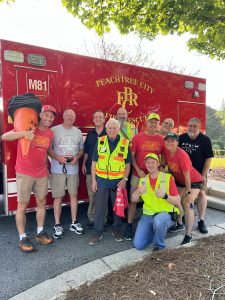
Members of the Fayette County Amateur Radio Emergency Services (ARES) provided support to the 2023 Tri-PTC Triathlon. Pictured here with Tri-PTC President Allen Leonard (on left). Photo/Kim Bramblett
We have a very active ham radio community here in Fayette County. There’s a network of five radio repeaters that have the ability to provide communications across the county and even link with other communities for statewide coverage. If the towers go down, we have the ability to do simplex, point-to-point communication. Lots of people in our community have their license, including our 911 Director, Katye Vogt, and the Publisher of this paper, Cal Beverly. Among the ranks of our members, we have people of all walks of life including students, first responders, educators, business people, retirees, and young adults.
So many of us, myself included, spend a lot of time on the internet. You are reading this article through a web browser, and you’re probably active on one or more social media outlets. I am as well, but what if all of that goes down? How would you get the news, find out what’s going on, or talk to your family? Ham radio is a hobby that’s both fun and useful. It’ll work when all else fails.
If you have any questions, don’t hesitate to comment here or contact me directly.
[Joe Domaleski, a Fayette County resident for 25 years, is the owner of Country Fried Creative – an award-winning digital marketing agency located in Peachtree City. His company was the Fayette Chamber’s 2021 Small Business of the Year. Joe is a husband, father of three grown children, and proud Army veteran. He has an MBA from Georgia State University and enjoys sharing his perspectives drawing from thirty years of business leadership experience. Sign up for the Country Fried Creative newsletter to get marketing and business articles directly in your inbox. ]
by Joe Domaleski | Jan 22, 2024 | Blog, Business, Columnists, Community, Front Page, News Center, Opinion, Top News
Our local business community needs your help. Two weeks ago, I wrote about trends facing small, local businesses in our community. Several readers reached out to me directly and asked for my thoughts on how to support the small businesses in our local community. This topic is timely, not only due to the current state of the economy but also because it’s the new year. The new year is traditionally when many of us resolve to do better with habits, resolutions, and personal goals. Consider setting a personal goal of supporting our local businesses more this year. Before listing ways you can support the local economy, let’s consider why that even matters. Please note that everything in this article applies equally well to our small, local non-profits. They need our support also.
Choosing to support local businesses is an act of community-building.
Let’s start with this newspaper. Unlike other news websites, the publisher of this online newspaper has chosen not to put up a paywall to generate revenue. In order to promote free speech and access to the news, revenue comes from advertising – unobtrusive, well-behaved, local ads that don’t pop up and block the content. Revenue is needed to help pay the staff who keep it running and the costs associated with maintaining one of the most popular websites in our community. Unlike other websites, this website is not run by robots or AI – it’s run by real people who report the news, write columns, and contribute hand-written content like this column I’m writing for all of you. Would you like to help? If you own a business, consider advertising. I advertise my own business, Country Fried Creative, on this site. I can tell you that it’s cost-effective and will be seen by more people than most of the other more traditional print and broadcast advertising. If you’re a consumer who doesn’t own a business, talk to your favorite businesses about supporting the paper by becoming an advertiser. Having a free press is vital to our community, but it needs funding in order to operate.
I recently read a short book entitled, How to Resist Amazon and Why by Danny Caine. The subtitle of the book is “The fight for local economies, data privacy, fair labor, independent bookstores, and a people-powered future.” Caine is the owner of a small, independent bookstore – Raven Book Store in Lawrence, Kansas. I won’t summarize the book here except to say that it was a real eye-opener. Support Caine’s efforts and order a copy online to read what he has to say. Like most of you reading this, we also use Amazon – it’s fast, inexpensive, and efficient. Yet, I’m also thinking maybe some of the things I order online should be sourced locally. Caine makes a persuasive argument that supporting local businesses is critical for fostering diverse, vibrant communities. He also touches on the implications of Amazon’s dominance, such as its impact on the publishing industry and its contribution to economic inequality.
When you support a small business,
you are supporting someone’s dream.
It’s not easy running a small business, staffed by local employees. The economic odds are stacked against us. Know that every dollar you spend is going to real people in our community who are trying to support their families. I have a great team, who are underpaid. Most of my peers who own businesses feel the same way. It’s hard to compete with big companies that offer big wages because they have monopolies in their industries, get lucrative government contracts, have access to lots of funding, and obtain subsidies that us small businesses don’t get. Despite that, we’re not looking for a hand-out. We’re willing to work for it, but we would like your support. If you agree and think it’s important to support small, local businesses here are three ways you can do it (even without money).
Shop local – if you’re looking for a place to eat, buy products, or purchase services, look in your community. The well-established ones will probably have a lot of marketing and will be easy to spot. Seek out those businesses who aren’t well-known – they need your money more than those with big marketing budgets. I don’t know about you, but I always enjoy discovering a place that I didn’t know about – especially in our community. There’s one area of the county that’s become our Hollywood. I think that’s great and I’m over there a lot myself walking around the lake (if you see me, stop and say “hi”), but what about the rest of our community that’s not the focus of all of that attention? Consider shopping local with less glamorous businesses. They need your support.
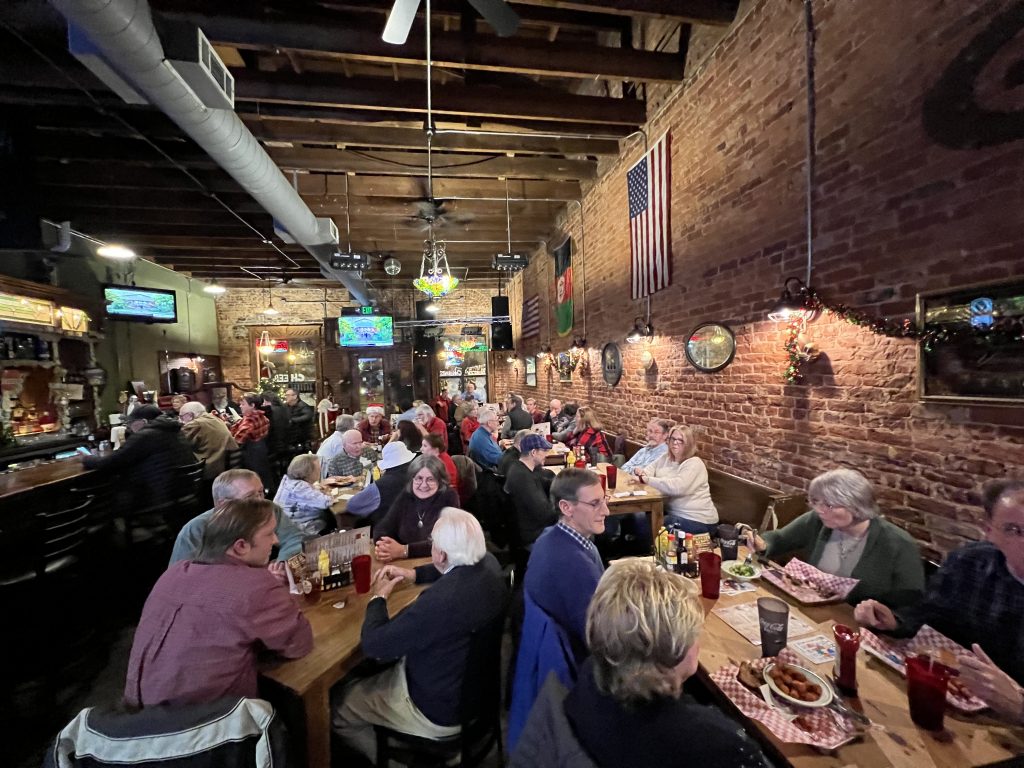
Members of the Fayette County Amateur Radio Club enjoy a group dinner at the historic Olde Courthouse Tavern on the square in Fayetteville. The Tavern is a small, locally-owned family business. Photo/Joe Domaleski
Support local – it’s easier than ever to support a small business online even without money. Consider following local businesses on social media and help them expand their reach by sharing, tagging, and commenting on their posts. Leave a positive review online. Sign-up for their newsletters. Seek out businesses (and non-profits) who need more online exposure and help them with some social media love. Doing this costs nothing. It’s human nature to follow a trend and popular things. It’s disappointing to see things trending that feature bland (and AI-generated) content. Some of that is cranked out right here in our community. Unfortunately, the way the algorithms work – popularity creates popularity (and many of those numbers are fake). Look for the content that’s clearly not well-financed and appears to be more homegrown. The big media players have plenty of attention, how about your favorite restaurant that doesn’t have many followers? Help them out and it costs nothing but a quick click!
Be kind – show your appreciation to the folks in the community who’ve invested time and money to keep the local economy vibrant. Check in with small business owners and employees to see how they’re doing. Even if you have a bad experience, resist the temptation to complain about it online. One bad review can destroy a business. Instead, talk with the business owner and help them get better and improve. Have patience and understand that small businesses have fewer resources than big businesses. You’re more likely to get better in-person service with a small local business than you are with the faceless large corporate entities and national chains. Let’s work together to help our local economy thrive especially those lesser known small, local businesses who need to get more exposure and attention.
In order to help the small, local businesses in our community get more attention and better marketing, I have partnered with the publisher of this newspaper to launch the Fayette Marketing Initiative. We intend to help local businesses get the attention they need, even if they don’t have much of a marketing budget.
If you’re a small business owner, let us know – we’d love to help you. If you know of a business or non-profit that needs marketing help, perhaps you would consider sponsoring them for the program.
Last year, a person of influence contacted me to pay for my company’s services to help promote a non-profit that couldn’t afford it. Now that non-profit is doing well and all they needed was some marketing. Who else in our community needs more publicity, especially if they can’t afford it?
You can contact me using the Fayette Marketing website or directly via email.
Supporting local businesses is not about charity; it’s about choosing to invest in your community and in the people who live in it.
[Joe Domaleski, a Fayette County resident for 25 years, is the owner of Country Fried Creative – an award-winning digital marketing agency located in Peachtree City. His company was the Fayette Chamber’s 2021 Small Business of the Year. Joe is a husband, father of three grown children, and proud Army veteran. He has an MBA from Georgia State University and enjoys sharing his perspectives drawing from thirty years of business leadership experience. Sign up for the Country Fried Creative newsletter to get marketing and business articles directly in your inbox. ]
by Joe Domaleski | Jan 15, 2024 | Blog, Business, Columnists, Community, Front Page, News Center, Opinion, Top News
What is your purpose in life? I’ve been thinking about that a lot lately. As a young man, I was mostly focused on getting through school. As I entered adulthood, my focus was on fulfilling my military service and getting started in life. Once I got married and started having children, my primary focus was on making money and providing for my family. These are all natural and typical American pursuits. Our family was very active in Church and we volunteered in the community, but if I’m honest our efforts in those areas were secondary to our other activities. My life’s path may be similar to yours. The first major “leap of faith” I took was starting my business twenty years ago. As I’ve shared previously, this was one way I attempted to bring together my goals of providing for my family and serving others in the local community.
Now that I’m in middle-age, I’ve been doing a lot of thinking. Raising a family and running a business has been my life’s work so far, but what kind of legacy do I want to leave in the final third of my working years? Is it to make a certain amount of money? Is it to have a certain headcount of employees? Is it to win some kind of award? Is it to land a certain kind of client? As I think on these things, the following quote really resonates with me.
“Life’s most persistent and urgent question is, ‘What are you doing for others?'”
– Dr. Martin Luther King Jr.
If all goes according to plan, this article will come out on MLK Day, and many of you will have the day off from work. You may choose to spend the day at one of the many MLK Day celebrations. Perhaps you’re going to participate in some kind of community service event that honors the tradition of making this a day of service. Not everyone has the day off. It’s always seemed ironic that often times the people associated with a holiday are often the ones least likely to get the day off. As you look around the community, many businesses are still open. This is because they are open to serve their customers and because they need the money, particularly the employees. Please consider supporting those that have to work today.
During his lifetime Dr. Martin Luther King, Jr. had a lot to say about a wide variety of subjects. Known primarily for his impact on civil rights and social justice, he also had quite a lot to say about work, professions, and community service. Here are some of my favorite MLK quotes related to work, purpose, and dignity:
- “All labor that uplifts humanity has dignity and importance and should be undertaken with painstaking excellence.”
- “So often we overlook the work and the significance of those who are not in professional jobs, of those who are not in the so-called big jobs. But let me say to you tonight, that whenever you are engaged in work that serves humanity and is for the building of humanity, it has dignity, and it has worth.”
- “Do you know that most of the poor people in our country are working every day? And they are making wages so low that they cannot begin to function in the mainstream of the economic life of our nation.”
- “We must rapidly begin the shift from a ‘thing-oriented’ society to a ‘person-oriented’ society.”
- “Set out to do a good job, irrespective of race, and do it so well that nobody could do it better.”
- “If it falls your lot to be a street sweeper, sweep streets like Michelangelo painted pictures, like Shakespeare wrote poetry, like Beethoven composed music; sweep streets so well that all the host of Heaven and earth will have to pause and say, ‘Here lived a great street sweeper, who did his job well.’”
- “Everybody can be great… because anybody can serve. You don’t have to have a college degree to serve. You don’t have to make your subject and verb agree to serve. You only need a heart full of grace. A soul generated by love.”
- “If you can’t fly then run. If you can’t run then walk. If you can’t walk then crawl. But whatever you do, you have to keep moving forward.”
- “The time is always right to do what is right.”
- “We need leaders not in love with money but in love with justice – not in love with publicity but in love with humanity.”
Those are some powerful quotes. Dr. King was such an eloquent speaker and writer that any commentary I would offer on the above wouldn’t do them justice. Let’s let those statements stand on their own merits. If you are a business leader in our community, take pause to reflect on Dr. King’s messages to us. If you are a worker, regardless of profession, do the same.
Indeed, Dr. King also said, “We may have all come on different ships, but we’re in the same boat now.” Regardless of what your role is in our community, please take the time to consider life’s most persistent and urgent question.
In closing, I’ll add the following which Dr. King wrote from a Birmingham jail:
“We are caught in an inescapable network of mutuality, tied in a single garment of destiny. Whatever affects one directly, affects all indirectly.”
[Joe Domaleski, a Fayette County resident for 25 years, is the owner of Country Fried Creative – an award-winning digital marketing agency located in Peachtree City. His company was the Fayette Chamber’s 2021 Small Business of the Year. Joe is a husband, father of three grown children, and proud Army veteran. He has an MBA from Georgia State University and enjoys sharing his perspectives drawing from thirty years of business leadership experience. Sign up for the Country Fried Creative newsletter to get marketing and business articles directly in your inbox. ]
by Joe Domaleski | Jan 1, 2024 | Blog, Business, Columnists, Community, Front Page, News Center, Opinion
Welcome to the start of a new year. It’s a chance to hit the reset button and start the year off with new goals and objectives. There are plenty of articles out there about setting general goals and resolutions, so we won’t cover that here. What I do want to focus on is one specific goal that I have and that is to spend more time learning and honing my own skills. Most of the readers of this newspaper tend to be middle-aged (like me) and older, so learning is even more important for us than younger people. We’ll come back to the reason I make that statement in a little bit.
For now, I’ve decided to adopt the personal theme of “New Year, New Skills.” This theme is one that applies to me as both an individual and as a business leader. In this post, I’ll delve into why continuous learning is particularly crucial for us in middle age and beyond, and how it impacts innovation and the vitality of our businesses. First, let me share a bit of personal history to make this more relevant.
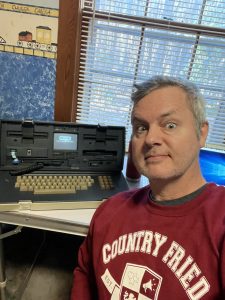
The author with a vintage portable computer from 1982, the Osborne I (still works) with 64K RAM, Z80 processor, two 5 1/4″ floppy disk drives, and a 300 baud modem. Photo/Joe Domaleski
Ever since the dawn of the desktop PC (personal computer) in 1980, I’ve had a fascination with technology. In high school, our class was one of the first to study computer programming (thank you Coach Horsley). My father taught data processing at DeKalb Community College, now Georgia State University Perimeter College. Dad bought one of the first portable computers, the Osborne-I “suitcase” computer which I had access to at home to further enhance my learning (see adjacent picture). In college, I decided to study Computer Science at University of North Georgia (formerly North Georgia College). Because Computer Science was in the Department of Mathematics, I ended up getting a dual degree in Math/Computer Science. Not only did I study computer programming, algorithms, and compiler construction, I also studied a lot of math including numerical analysis, calculus, statistics, linear algebra, and matrix math. Calculating dot products on matrices is not something I ever thought I’d see later in life, but I was wrong.
After my stint in the Army, I entered graduate school to work on my MBA at Georgia State University. One class I particularly enjoyed was decision sciences. In the class we used computers (mostly Lotus 123 spreadsheets) and statistics to solve business problems and perform optimization analysis and forecasting. Often times I decided to write my own programs to solve these problems. After class one day, I started talking to one of my professors who mentioned something called a “neural network” as an emerging concept for computer aided decision making. Knowing that I had a background in computer science he asked me to collaborate with him on creating a rudimentary neural network (written in the C programming language) to do financial market graph pattern matching. The math behind neural networks was and still is matrix math (just 4 years earlier I thought I’d never see a matrix again). We did some good work and I was invited to apply to pursue further studies as a PhD candidate. I decided not to pursue a PhD, even though I had been accepted into the program, in order to start a family and make money.
Fast forward 30 years later and I want to be student again. Don’t get me wrong, I’ve learned a lot by being a consultant for the first 10 years of my career and even more by being a small business owner for the next 20 years. But something has rekindled my original interests in math/computer science – yes, the re-emergence of Artificial Intelligence. Faster computers and 30 years worth of Internet data has finally brought AI out of the lab and onto our phones. Most people don’t give AI a second thought, as it has crept into your life by tagging your pictures, planning your routes, suggesting what movies to watch, recommending music you might like, and serving up a steady stream of social media (and ads) on your phone. Some people are blindly using it to generate bland written content and sterile images (please don’t do that, we can tell the difference). Others are using it to good effect by helping them almost like a personal assistant. But this isn’t a story about AI, it’s a story about learning and why it’s become important to me again.
As a middle-aged person, it’s not lost on me that my career has peaked. No, I’m not retiring but as I’ve mentioned in previous articles, the story isn’t about me anymore – I’ve done the things I’ve wanted to do and as the “old guy” it’s my job to mentor and support younger people to help them succeed such as my adult children, the staff at my company, and other aspiring leaders in our community. Yet, I’ve been toying around the idea of a “Second Act”. How can I keep my mind sharp, stay relevant, and pursue earlier interests that I put on hold? Learning!
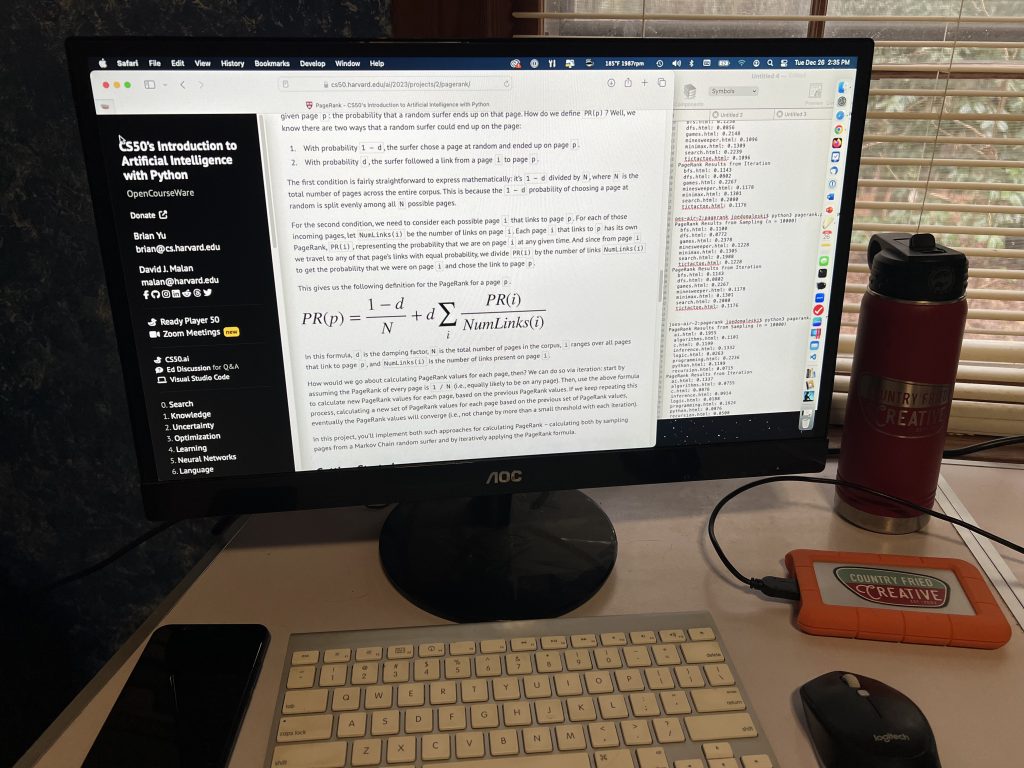
In our home office keeping my skills sharp by working on a Google PageRank project for a class in developing AI applications using Python programming. Photo/Joe Domaleski
In a recent article for Scientific American (June 2023), Dr. Rachel Wu and Dr. Jessica Church Lang have written a compelling article entitled “To Stay Sharp as You Age, Learn New Skills.” It’s worth a read. There are countless other articles you can read about the benefits of learning, participating in hobbies, doing puzzles, and other “brain activities” to help us stay sharp in the second half of our lives. Young people are generally better at learning than older folks. For many, learning tends to peak by age 40. Other than some professions having mandatory continuing education requirements, most working professionals over 40 tend to stop formal learning. Over 50, which includes me, many tend to not want to learn anything because we’re set in our ways. That’s brittle thinking and leads to obsolescence. I think it’s possible to leverage “older knowledge” with newer learning and skills. In my case, what’s old is new again in the form of AI which is powered by concepts I learned over 30 years ago – matrix math and neural networks!
So, what are some of the benefits of learning new things?
Enhanced Cognitive Function: This is just a fancy way of saying that learning new skills stimulates the brain, helping to keep you sharp. As was mentioned in the Scientific American article above, this can be particularly beneficial in delaying or reducing the risk of cognitive decline associated with aging. Let’s start learning right now by looking up the word “neuroplasticity.” Consider how that relates to the learning experience.
Improved Memory: Engaging in learning activities has been shown to improve memory. When we learn new things, we exercise our “memory muscle”, which can help in retaining information better and for longer periods. By the way, have you seen my car keys?
Increased Emotional Well-being: Learning new skills can boost self-esteem and confidence. It provides a sense of accomplishment and can be a source of joy and fulfillment. I know one recent innovation of learning is to “game-ify” the process where certain learning goals attainments are rewarded by earning points and unlocking achievements, just as you would in a game.
Social Engagement: Often, learning involves interacting with others, whether it’s in a class setting or online forum. This social aspect can be vital for older adults, helping to combat loneliness and build a sense of community. This was impacted a few years ago by the COVID-19 pandemic, but it also lead to the development of more online community learning. I personally like a mix of both online and in-person learning.
Keeping Up with Technological Advances: In a world where technology is also changing, learning new tech skills keeps us connected and able to engage with modern tools, from smartphones to the latest software. For example, I originally learned spreadsheets with SuperCalc, followed by Lotus 123, then Microsoft Excel, and now Google Sheets. The concepts are the same, but the tools have evolved. Pro tip for some of my peers, stop using Microsoft Powerpoint and consider using Canva! My staff helped me learn about that one.
Physical Health Benefits: Some learning activities, especially those that involve physical activity like dance classes or yoga, can have direct physical health benefits, aiding in maintaining flexibility, balance, and overall fitness. Learning doesn’t just have to be a brain activity. Last year I took up ballroom dancing so that I could dance at my daughter Alex’s wedding. I’m still not that good at it, but it was a great learning experience.
Adaptability to Change: Learning new skills helps us (particularly older adults) stay adaptable in a changing world. This adaptability is important not just for personal growth but also for understanding and relating to younger generations. I am constantly learning things from younger people and strive to keep an open mind about new ways of doing things.
Career Enhancement: For those still in the workforce, learning new skills can lead to career advancement or even a change in career paths. Learning helps keep people competitive in the job market. Ask an employer (including me) what the number one challenge is and we’ll tell you it’s finding a qualified workforce with the skills to do today’s work and a willingness to continuously learn in order to be prepared for tomorrow’s work. Back to AI – if you are not learning about how to use it (both its strengths and weaknesses) you will be left behind in the workforce.
Intellectual Curiosity and Lifelong Learning: Fostering a culture of intellectual curiosity can lead to a more fulfilling, enriched life. It keeps the mind active and engaged, crucial for maintaining mental agility. I enjoy learning new things, solving problems, and staying relevant. Learning helps you to be a more interesting person at parties and other social gatherings.
Creativity and Innovation: Learning activities expose us to new ideas and perspectives, which can ignite our own creative processes that lead to innovation. Creativity and innovation are two of the most important success factors for a business, especially in today’s algorithm-driven world. Indeed, one reason I have renewed my interest in AI is to peer back into the “black box” to see what’s going on. Most people don’t bother fact-checking or understanding the how/why of things. I think that’s a mistake.
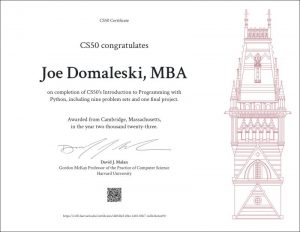
The author’s Harvard University CS50P – Programming in Python certificate of completion. Photo/Joe Domaleski
So back to me and my goals for the new year. What have I personally been doing to learn and improve my own skills? One of the ways has been to write this weekly column. I’ve always enjoyed writing, but haven’t had much of an opportunity until recently. One of the best ways to get better at something is to do it. I’m very appreciative of the support and feedback about this column that many of you have given me in person and on social media. Another way that I’m trying to be more deliberate about learning, is to take formal online classes. I recently completed a Harvard University CS50 online class about Python (it’s not a snake, it’s a modern computer programming language used in AI and data science) and am enrolled in a class right now where we’re actually developing AI applications. I’m looking forward to applying those skills with our marketing clients. At work, we’ve been fostering a culture of learning and skills development by encouraging staff to obtain industry certifications. Certification programs help encourage and validate skills development. Every team member participated, including me.
As I start this “New Year, New Skills” endeavor, I invite you, my readers, to join me. Let’s challenge the stereotype that learning is just for the young. Whether it’s rekindling an old interest, picking up a new hobby, or enhancing our professional skills, let’s demonstrate that age is just a number when it comes to learning. Not only will you be setting a good example for others, but the young people in your life will be glad you’re making an effort to stay relevant and up-to-date. Let’s make this year not only about achieving our business goals but also about personal growth and intellectual enrichment. Remember, the journey of learning never ends, and it’s never too late to start. You may find out, like I did with matrix math and neural networks, that your original knowledge is still valid, it just needs an update to be relevant in today’s world.
[Joe Domaleski, a Fayette County resident for 25 years, is the owner of Country Fried Creative – an award-winning digital marketing agency located in Peachtree City. His company was the Fayette Chamber’s 2021 Small Business of the Year. Joe is a husband, father of three grown children, and proud Army veteran. He has an MBA from Georgia State University and enjoys sharing his perspectives drawing from thirty years of business leadership experience. Sign up for the Country Fried Creative newsletter to get marketing and business articles directly in your inbox. ]
by Joe Domaleski | Dec 18, 2023 | Blog, Business, Columnists, Community, Front Page, News Center, Opinion
Many of you reading this article barely made it through the year. You’re probably already seeing a lot of people posting highlight reels of the year on social media. Perhaps you’re getting another “brag letter” from a friend or family member in your Christmas card. For some, it may have been their best year ever. That’s awesome. For many others, this may have not have been their best year. If that describes you, don’t let that take away from your joy and sense of accomplishment. As they say, “comparison is the thief of joy.” You made it through a tough year and I want to acknowledge your resilience.
“Do not judge me by my success, judge me by how many times I fell down and got back up again.” – Nelson Mandela
Earlier this year, my business celebrated its 20th anniversary, an impressive milestone to be sure. Yet, it wasn’t our best year ever. For the first time in many years, our business did not grow in terms of employees or revenue. Things started to slide a little at the end of 2022. We didn’t lose money, but it wasn’t a super growth year like it’s been over the previous four years. Inflation and economic uncertainty have impacted many of our clients, some of whom are scaling back. When that happens, it impacts us. I don’t mind sharing that with you. Many people feel the need to share a false image of perpetual “I’m always winning” success online. I think it’s important to be candid here. If you’ve struggled this year, you’re not alone.
Being in business for twenty years has given me perspective. Over the course of my business career, it’s been my honor to receive many personal and organizational awards – several of which have been chronicled in this newspaper. I’m now at that stage of my life and career when the spotlight is not on me, it’s on others – mostly younger people. One of the benefits of being a previous award winner is that I get to sit on many of the selection committees that pick award recipients in our local community. We have some really impressive people in our community, fine businesses, and great non-profits. Yet, we also have many people doing great things that we never hear about – people who aren’t in the spotlight but are courageous and brave.
On a personal level, the same holds true. When I was younger, I was a fairly competitive age-group runner. Now that I’m older and dealing with arthritis, I’m not really running anymore. Although I stay fit, my best athletic days are behind me, and I live vicariously through others’ marathons, triathlons, and other athletic accomplishments. I have gray hair, wrinkles, and have a hard time staying awake past 9:30pm at night. Not only with athletics and health, but this is the same with life achievements. It’s fun to see my (now adult) children and many of the children of my friends graduate college, get married, have babies, and achieve other life milestones. Yet, for every winner and accomplishment, there are hundreds of others who aren’t publicly recognized. Their achievement is just making it – paying down student debt, handling setbacks, or just paying the bills. Sometimes I think it’s harder to “just get by” than it is to win something or achieve some life milestone. Just surviving is underrated.
Make no mistake, competition is part of life. I don’t advocate “dumbing down” standards so that everyone is a winner. But what I do know is that life has its ups and downs. Some winners don’t have to work as hard as those who are just making ends meet. Winning doesn’t last forever, but neither does losing. Our society likes to celebrate champions, money, and “famous people.” But there’s more to life than money and fame. Personally, I’m more inspired by people who overcome adversity and display resilience.
A friend of mine posted this recently online:
“I don’t think anyone really understands how tiring it is to act okay and always be the ‘strong’ one when in reality you’re close to the edge.” – Anonymous
I see you out there, survivors! You’re not alone. Here are some thoughts about what helps me get through tough times:

This is more realistic social media picture than most. #gowiththeflow Photo/TikTok
Finding my tribe – Both personally and professionally, the camaraderie of friends and family has been a lifeline. My tribe gives me perspective, a much-needed break from the “front lines,” and allows me to be who I want to be in a non-competitive way.
Celebrating small wins – This year, success was measured in modest terms. Sometimes, it was as simple as getting a new client, helping an organization meet their fundraising goal, helping a neighbor, or just waking up early to exercise. These small wins were important steps towards larger goals.
Adapting to change – If there’s one thing this year has taught me, it’s the importance of being adaptable. Artificial intelligence (AI), inflation, changing customer sentiment, and other life complexities have made even the simple stuff seem hard at times. Being agile and not stuck in the past is important. Long-time relationships change and evolve over time.
Having a positive attitude – I’ve been around long enough to know that nothing lasts forever and that many things are simply beyond my control. Truth is, you can do everything right and still not get the outcome you want. A positive attitude creates hope and encouragement for me, my team, my customers, and my family.
Being resilient – Resilience is the quiet strength that kept me going when times got tough, easy things became hard, and plans didn’t go the way I thought. Resilience (and perhaps some stubbornness) is what made me adapt, pivot, and find new ways to run the business and participate in the local community.
As we close this year and prepare for the next, I want to congratulate those of you who just barely made it. I see you and appreciate you. Remember, every challenge overcome is a testament to your strength and determination. Whether you’ve achieved great milestones or simply managed to get through each day, your journey is worthy of celebration. Here’s to you, who persisted despite the odds, who found joy in the small victories, and who continue to do the right thing, because it is the right thing to do.
To you, who made it through – congratulations! You’re a winner in my book.
[Joe Domaleski, a Fayette County resident for 25 years, is the owner of Country Fried Creative – an award-winning digital marketing agency located in Peachtree City. His company was the Fayette Chamber’s 2021 Small Business of the Year. Joe is a husband, father of three grown children, and proud Army veteran. He has an MBA from Georgia State University and enjoys sharing his perspectives drawing from thirty years of business leadership experience. Sign up for the Country Fried Creative newsletter to get marketing and business articles directly in your inbox. ]

